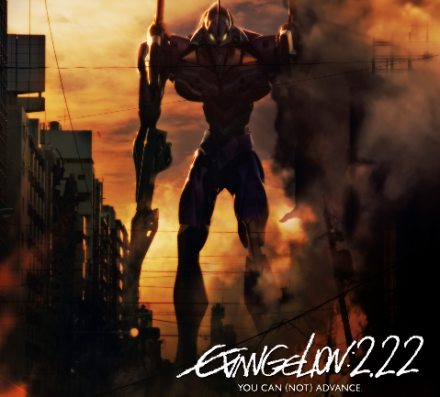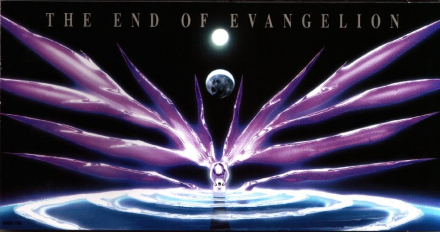If there’s one thing that I’ve learned, it’s that Evangelion is much more than a robot fight . . .
The Evangelion franchise holds a very biased but special connection with me, for reasons unknown. I get thrilled by the interesting story, the amazing action, and especially, I love the characters. But what happens when one of my favorite series throws a world of hurt on my favorite character? I get angry, and 2.22 did me in.
Leaving off from the first film, 2.22 centers on four psychologically-damaged teens that pilot synthetic humanoid robots called Evangelions, where their mission is to protect mankind from the wrath of the heavens. On the horizon looms a secret organization that plans to initiate the Third Impact, which will somehow destroy the world.
Possibly one of the best anime openers I’ve seen, the film kicks off with two new Eva pilots taking out two new Angels. These couple of introductory fights really draw the viewer back into the chaotic world where mass destruction became commonplace.
All of the intense Angel clashes are exhilarating, as execution timed with high stakes makes for desperate situations that are completely entertaining in all aspects. You can’t simply call it a Rebuild anymore, as Studio Khara has outdone themselves by completely transforming a beloved series into a dazzling spectacle. Evangelion will be around for a while, and these Rebuild films make it cut in stone. Animation of architecture is clean-cut, the CG Evas and Angels are terrifyingly gorgeous, and the characters stand out wonderfully against the detailed, digitally remastered world.
The movie rolls along smoothly between fights, developing Shinji and Rei’s relationship in a quicker and more delicate manner than the original series. Possibly because a lot of their uninteresting scenes are taken out, I definitely like the Rebuild‘s Rei over NGE‘s. Shinji and Rei’s characters act much more natural, allowing personal growth and maturity to take its roots earlier on. I mean, boy-wonder makes a couple decisions for himself and quiet girl grows emotions – it’s already miles ahead of their original status!
Then there’s the mysterious Mari, a character who, despite not knowing much about, adds a new enjoyable level to Evangelion. The fun fourth pilot reveals she fits the pattern for traumatized individuals when she brutally forces control over a transformed Eva Unit 02 towards the end, a gruesome scene so aggressive that it still stuns me now! It’s interesting to note, however, that she’s always in full control, never once letting the Eva take her over instead. This one intriguing difference sets her piloting abilities above the Second Child, whom I’ll talk about next.
Here’s where I really hate 2.22 and what they did. First off, Asuka’s name has been changed from Asuka Langley Soryu to Asuka Langley Shikinami – it just doesn’t sound very German anymore, which she is. Second, Asuka is known for her dominating attitude and brash, “high and mighty” sass-talk. They reaffirmed that, which was awesome, but they took out a scene where Asuka, speaking in German, answers a call from her home. It was a small yet memorable scene from NGE that created my love and interpretation for one of my favorite anime characters EVER. She’s still an ass to everyone, yes indeed, but she doesn’t feel like the same Asuka I came to love from the original.
*Spoiler Rant Ahead*
The true “break” starts when Asuka test pilots the new Eva Unit 06, rather than Shinji’s friend Touji. If you remember NGE, Unit 06 ascends into the next Angel, which Shinji must kill – pilot included. So when Asuka gets brutally crushed and torn to pieces (shortly after she was revealed to be still alive), I WAS FURIOUS! Never have I ever seen something in anime so insulting that left me more enraged than this gut-wrenching horror scene. I honestly couldn’t believe my eyes to see Asuka ripped to sh*t like this, and it didn’t help that the calm child folk song “Tsubasa wo Kudasai,” sung by Megumi Hayashibara, was the only thing you could hear. Well, that and the screams.
Rebuild 2.22′s ultimate climax invokes similar feels to Instrumentality in The End of Evangelion. The film even has its own relaxing slow song “Komm, süsser Tod” scene infamous to Hideaki Anno’s work, where chaos, death, and transcendence has never looked so beautiful yet depressing. Ending the film is an acoustic version of Utada Hikaru’s “Beautiful World,” which is a reprise of 1.11’s ending. Such a fitting trance song ~
As much as I abhorred the abuse of Asuka in this film, I can’t help but admire the fact that an anime made me feel something so powerful and emotional. Because Evangelion: 2.22 You Can (Not) Advance managed to rip at my heartstrings, provided top-notch animation quality, and proceeded with its own continuation of a spectacular series, I must award the film a 5/5 in the entertainment category. The Rebuild rekindles my mind and emotions, and most of all, it reminds me why I fell in love with Evangelion in the first place. Though it is not the same mindset, it is still the same, great Evangelion.
+ Stunning, crisp animation, most effective CG
+ Improved character development, great new additions
+ Music adds to film, interesting insert songs
+ “Break” route proves a masterful addition to the franchise
– Asuka swap with Touji is inconceivable
– Song that plays during Unit 06 scene could have been more epic
– It’s only another movie in the series, still needs an ending
There! I’m finished with my Evangelion experience until 3.33 comes out, which it better this year cause it’s 2015! You should immediately pick up 1.11 and 2.22, as they are fairly cheap, house cool extras about the animation, and are both dubbed by FUNimation, who knows exactly how to execute an English dub! I recommend the Rebuild series to fans of NGE, individuals who are exploring the mech genre, and to those looking for something that’ll rack your brain. This film was an exhilarating, surprising, and brutal follow-up – I Was (Not) Disappointed! Until next time, this has been
– Takuto, your host



